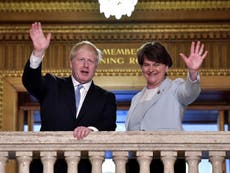Brussels insiders tell me they’re about to reject Boris Johnson’s new Brexit deal – and this is why
‘It is not going to fly,’ they said. ‘This is a deal-breaker.’ The prime minister will have to give more ground

First, the good news for Boris Johnson. His long-awaited Brexit plan would probably be approved by the Commons. That would be quite a feat as it includes many elements of Theresa May’s withdrawal agreement, which was rejected three times by majorities of 230, 149 and 58.
But now the bad news: it is very unlikely to be put to a Commons vote in its current form because the EU looks set to reject it.
Brussels is wary of dismissing it out of hand, knowing that some Johnson allies cannot wait to start blaming the EU for a no-deal exit. But the proposal for some customs checks, even though away from the Irish border, is still considered “totally unacceptable”, one Brussels insider told me.
“It is not going to fly. This is a deal-breaker,” they said.
Another source said there was also “grave concern” about handing the Democratic Unionist Party a veto, via the Northern Ireland executive and assembly, on a regulatory zone that would in effect keep the province in the EU single market. The EU has its own veto on a deal: the European parliament must approve it, and the initial reaction of MEPs was hostile. Dublin reacted more strongly than the European Commission, and there is no sign of the EU abandoning the Irish government.
So Johnson is now faced with a catch-22: a deal acceptable to parliament won’t win EU approval, and vice versa.
Should he have got the EU onside first, and then tried to sell a deal to MPs? Perhaps. But there was a logic to doing it in the way Johnson did. The EU, its fingers burnt by May, has been reluctant to make concessions until it is confident a deal would secure a Commons majority. If Johnson can show there is what Michael Gove hailed as a “pretty solid majority”, it puts pressure on Brussels.
The question now is whether the EU rejects the UK plan or enters formal negotiations. London is ramping up the pressure, hinting that talks must start this weekend and even threatening that Johnson might not attend the crunch EU summit on 17 & 18 October.
If serious negotiations take place, Johnson would have to give ground. There are signs he would. He has dropped the Downing Street spin that this is his “final offer”. One Whitehall source admitted: “There is scope for some movement on our side.”
One option would be to ditch Johnson’s customs plan in return for a time limit to the hated Irish backstop. But keeping Northern Ireland in the EU customs zone would almost certainly be a U-turn too far for Johnson. It could cost him the support of the DUP and the European Research Group (ERG) for his proposed deal. So Johnson might then have an agreement acceptable to Brussels but not parliament. Catch-22 again.
He cannot make concessions without keeping the DUP onside, since many Tory MPs take their cue from Arlene Foster’s party. The ERG’s hints of support after meeting Johnson last night are significant. Some ERG figures have previously claimed 60 Tories would oppose a deal based on May’s agreement even if the Irish backstop were removed, as it would be under Johnson’s plan.
The penny has finally dropped for the hardline Eurosceptics: this might be their last chance of securing Brexit without the gamble of a general election. Johnson could also rely on most of the 21 Tories who lost the whip for rebelling against no deal. He might need a handful of backbench Labour votes, but that is likely.
But, for now, it looks like there won’t be a deal to put to a Commons vote.
What happens then? The Benn Act, forcing Johnson to seek an extension to the UK’s EU membership to prevent no deal on 31 October, kicks in on 19 October. Despite suggestions from ministers that Johnson has a secret plan to get round the act, they appear not to know what it is when quizzed in media interviews. It may be that the secret plan is that there is no secret plan; Downing Street wants MPs and the EU to think one exists, so they both sign up to an agreement to avoid no deal. But Brussels is cleverer than some Johnson allies think. It knows the Benn Act takes some of the pressure off the EU to strike an agreement. It might decide to wait and see what happens in an election during the three-month extension envisaged in the act.
If there is a secret plan, it is probably that Johnson sits on his hands on 19 October in the knowledge he would be taken to court. The government would lose, then grudgingly obey the law and request the extension the prime minister said he would never seek. In a general election, Johnson would in effect be asking for a mandate for no deal. That might allow him to squeeze the Brexit Party vote, as he knows he needs to do.
The critical question would be whether Leave voters punished Johnson for the extension. The bad news for his opponents is that his allies are increasingly confident he would be able to deflect the blame to parliament, the EU and the judges. Jeremy Corbyn should think about that before he approves an election.




Join our commenting forum
Join thought-provoking conversations, follow other Independent readers and see their replies